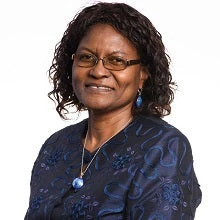 Mercy Tembon Country Director for Bangladesh with women in Ashuganj
Mercy Tembon Country Director for Bangladesh with women in Ashuganj
International Women’s Day reminds us of the sacrifices and resilience of women globally, and how their contributions to a more sustainable future can be unleashed, as they push the boundaries to assume positions in boardrooms, universities, technology start-ups. It also reminds us of the challenges that gender inequality imposes on half of the world’s population
But the discussion about gender equality is not just about holding the clutch steady, it is about stepping on the accelerator. Studies have shown that $12 trillion could be added to global GDP by 2025 by advancing women’s equality. The world would be better off with a gender inclusive agenda that unleashes the productive power of women. An agenda that advances women’s education and access to information, protects women’s rights, improves women’s access to agricultural inputs and land ownership, promotes female entrepreneurship and financial inclusion, and increases the participation of women in decision making positions in the government, parliament, and the labor market.
Celebrating beyond the factories
In Bangladesh, progress has been achieved in several key areas of this agenda: Reduced fertility rates and gender parity in schooling have ushered in millions of women into the workforce, especially those from poor areas. The country’s ranking of Female Labor Force Participation is 36 percent, higher in comparison to the South Asia average of 23.6 percent. The success of the Readymade Garments (RMG) sector where about 80 percent of the employees are women, has driven change in urban public spaces, and improved women’s social mobility. Although many are still working on the floors, a small but increasing number are pursuing higher education courses to enable them to take on managerial or supervisory roles.
But the celebration of Bangladeshi women is not just confined to the RMG sector. Bangladeshi women continue to demonstrate that given the opportunity, they will blaze the trail as successful entrepreneurs, sportswomen, scientists, and farmers. The story of Salma, a mother of three in Mymensingh district who emerged as the breadwinner of her family following an accident that left her husband disabled is a case in point. With support from a revolving fund from a World Bank-funded project Salma was able to buy a cow and start her livestock business. Within two years, she has become a proud owner of a cow farm with 10 cows. She was given a chance and she proved that translating an economic opportunity into a successful business enterprise is gender neutral.
From Wasfia Nazreen’s conquest of the Seven Summits in 2015 to the Under-19 football team clinching the 2021 South Asian Football Federation Championship, women are scaling new heights every day. In 2020 during the pandemic, it was the young scientist, Dr. Senjuti Saha, who led the way for decoding the genome sequence of SARS-CoV2 in Bangladesh.
The COVID-19 pandemic opened a window of opportunity for women to showcase their capabilities, leveraging social media as a platform for entrepreneurship. For example, estimates show that more than 50 percent of Bangladesh-based Facebook stores are female-owned. Similarly, Cookups has emerged as a thriving online business of connecting diners and home cooks, as did such microenterprises like Kings Fashion from Bhairob which switched from making small mini garments to stitching face masks with UN-approved designs from the Directorate of Health Services.

Opportunities for all
The urgency of gender equality for a sustainable tomorrow calls for bold solutions.
First, we must accelerate equality by providing the necessary skills to women, especially in science and technology fields. We should also raise the degree of empowerment by making it easier to have access to finance, reducing the gender gap in mobile phone ownership, and assisting those who want to move from the lower ranks to managerial positions.
Second, we must support low-income women in the informal sector to become self-employed and microentrepreneurs, addressing the most critical constraints of access to credit and skills, and aligning with many women’s preference for self-employment. Focusing on the informal sector also addresses a major programming gap, especially given that 97 percent of female employment in Bangladesh is in the informal sector. New measures to address gender-specific constraints like affordable childcare for women from poor households will be critical in the way forward.
Finally, we must involve more women in decision making at local and national levels, to ensure that their interests are well represented. Climate change will affect economic opportunities for all. It is therefore important for women and men to be equal agents of change for a resilient and faster recovery. Equal opportunities to become socially and politically active can create productivity gains that will lead to a more inclusive and sustainable development for all. At the end of the day, we know gender equality is simply smart economics.


Join the Conversation